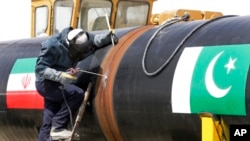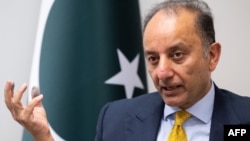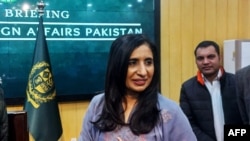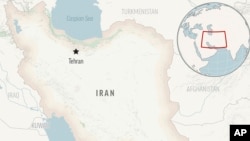
Pakistan Federal Minister for Petroleum Musadik Malik said Wednesday that international sanctions have caused complications for the Iran-Pakistan cross-border natural gas pipeline project.
Media outlets reported that Iran had warned Pakistan to complete its part of the project or face an $18 billion penalty — news that sparked a debate days later in Pakistan's lower house, the National Assembly.
Responding to a question by a lawmaker on the floor of the house regarding Iran's final notice, Malik said, “This is a deeply complicated matter and involves international sanctions."
Malik did not provide more details about sanctions, but said the government is available to discuss the complications.
He rejected the penalty figure of $18 billion, saying, “I do not know where it has come from.”
In response to a query regarding reports of Iran's notice, Pakistan Foreign Ministry spokesperson Mumtaz Zahra Baloch said last week that Pakistan had taken note of the development.
“Pakistan and Iran have robust channels of communications including this matter. We have always said that we would like to resolve all issues [with Iran] through friendly consultations,” she said during a briefing.
Petroleum Minister Malik, during an informal conversation on the gas pipeline project with local journalists in March, confirmed that Pakistan would present its case to the U.S. and seek an exemption from sanctions.
“We cannot bear American sanctions. We will present our stance to the U.S. We want to complete this project but without any sanctions," Malik told journalists.
However, Pakistan Foreign Ministry spokesperson Baloch, also in March, said that the project is progressing "in conformity with our commitment to the Iran-Pakistan pipeline." She emphasized that Pakistan perceives no grounds for objections from external parties as the construction activities are confined within Pakistani territory.
During a briefing Tuesday, U.S. State Department spokesperson Matthew Miller said that helping Pakistan address its energy shortage was a priority for the United States. He added, however, that "we will continue to enforce our sanctions against Iran. We also advise anyone considering a business deal with Iran to be aware of its possible ramifications."
Pakistan experts say Pakistan failed to meet its commitment to build its part of the pipeline for several reasons, including a volatile security situation in Balochistan, where the pipeline is supposed to pass. Gas pipelines are not safe in restive Balochistan and Baloch insurgents frequently target gas pipelines in the resource-rich southwestern province bordering Iran.
“In my opinion, however, Pakistan’s real worry is U.S. sanctions," said Naveed Hussain, an editor of the Pakistan English daily newspaper The Express Tribune. "It has declared force majeure, but Iran says Pakistan had signed the agreement while being fully cognizant of [the] U.S. sanctions risk, especially when India had withdrawn from the project for the same reason.”
Khaleeq Kiani, who writes about the economy for the Pakistan English daily newspaper Dawn, told VOA, “The U.S. stance is clear, and recently it imposed sanctions on companies providing equipment to Pakistan missile programs, that was a clear indication to Pakistan to not proceed with the pipeline project.”
In April, the U.S. imposed sanctions on four entities — one based in Belarus, and the other three in China — for supplying missile‐applicable items to Pakistan’s ballistic missile program, including its long-range missile program.
Despite that precedent, Pakistan's foreign minister, Mohammad Ishaq Dar, said at a May press briefing that Pakistan would not succumb to international pressure on the pipeline project.
“We will not let anyone use their veto,” Dar said, without naming the United States.
Dar's remarks came weeks after Donald Lu, the U.S. assistant secretary of state for South and Central Asian Affairs, told a U.S. House Foreign Affairs Committee hearing that importing gas from Iran would expose Pakistan to U.S. sanctions.
Pakistan is facing gas shortages and relies on subsidized gas, putting pressure on the national exchequer, Petroleum Minister Malik said on the house floor Wednesday.
Originally envisaged as the Iran-Pakistan-India pipeline, the project was reduced to a bilateral agreement after India pulled out in 2008. Tehran and Islamabad signed a 25-year contract in 2009 to export gas from Iran through a 2,400-kilometer gas pipeline to be built jointly by both countries.
While Iran has completed its pipeline section, Pakistan keeps dragging its feet on the project. In 2019, the two countries revised their contract, and Islamabad committed to building its portion of the pipeline by 2024.
This story originated in VOA’s Deewa Service.









